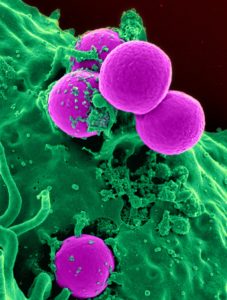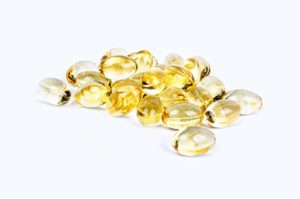Autoimmune Disease and Your Immune System:
This is Important to Know if You Have an AI Condition
Why You Should Know About T Helper Cells if You Have an Autoimmune Condition
T helper cells are part of your immune system. These cells are lymphocytes and lymphocytes are part of your white blood cells. Their job is to recognize foreign invaders or as in the case of an autoimmune condition they mistakenly see self as the invader. They respond to this invader by producing cytokines which are hormonal proteins that are responsible for the biological effects of the immune system. Think of cytokines as chemical messengers that “make things happen”.
You have two groups of T helper cells but both groups should work together in harmony. It is normal for one side to become more active to eliminate a threat, but then should return to a balanced state once the threat is gone. This issue arises when one side remains more active than the other.
In the case of an autoimmune condition, there is always a genetic component. However, just because you have the gene for a specific autoimmune condition, does not mean you will get it. The gene needs to be “turned on” by something, whether it is a food sensitivity, stress or other dietary factors, for example.
There are varying opinions as to if you can turn the gene off once it is turned on. My own opinion is that I think in some cases the gene can be turned back off but in most cases, it is critical to support the immune system, restore balance and reduce inflammation so that you can put the AI disease into “remission”.
Th 1 Pathway
This is your immediate response pathway. This is your body’s firsts line of defense against a pathogen.
If you are Th 1 dominant, this means that you are producing too many natural killer cells and cytotoxic T cells. The cytotoxic T cells are also called killer T cells and can kill body cells that are infected with a virus or other agent.
Typically, Th 1 cells are more active when there is a virus, bacteria or other microbe that is the invader. Your Th1 cells should be more active during an acute illness and when there is acute inflammation. However, when Th1 cells are in excess, they can give way to AI conditions and can create low Th2 levels.
Some AI conditions that are associated with an overactive TH1 pathway include Type 1 diabetes, MS, Hashimotos, Grave’s Disease, Crohn’s Disease, Psoriasis, Sjogren’s Syndrome, Celiac Disease, Lichen Panus and RA. Please note that while an overactive TH1 pathway is more common in these conditions, it is not always the case and may not be for you!
Th 2 Pathway
If you are producing too many B cells, the ones in charge of tagging the intruder so that it can be identified, then you are Th 2 dominant.
Typically, you will see Th2 cells produced in excess in conditions such as asthma, eczema, rhinitis, allergies and in chronic inflammation. Other conditions that are most often associated with an overactive Th 2 pathway include Lupus, Scleroderma, IBD, cancer, Ulcerative Colitis, and multiple chemical sensitivity.
When you have one pathway dominant, it means that the immune system is out of balance and this can lead to an AI condition if it has not done so already. In the case of thyroid disease, Th1 and Th2 cytokines can affect thyroid function and not just the AI portion of the disease. They can block the thyroid receptor sites and this will prevent the hormone from getting into the cells where you need it to start feeling better.
It can be tricky to deduce which helper cells you have an issue with as both can be overactive or you can have both underactive as well.
What Can Cause Your Immune System to Become Unbalanced
- A diet of excessive refined carbs and sugar
- An unknown food sensitivity
- Excessive, ongoing stress (too much cortisol production suppressed the immune system)
- Having a digestive disorder
- Alcoholism
- Exposed to heavy toxic metals (these suppress antibody production)
- Pesticides and other toxic chemical ongoing exposure
- Over use of NSAIDS
- Too much exercise
- Gut imbalances (poor microbiome health)
- Too much fish oil supplementation-best to stay at 5 grams or below (depending on the health condition some people may need 2 grams to 4 grams per day)
- Chronic Antibiotics
- Cancer
Balancing Your T Helper Cells
The first step, according to Dr. Kharrazian in “Why do I still have thyroid symptoms when my lab tests are normal” is to support the T regulatory cells. It is believed that the T regulatory cells may help to keep the other T cells under control, but it is not very clear how they do this. T regulatory cells are thought to monitor the situation but can start behaving erratically and when this happens they may command the production of too many T helper cells and this process can ultimately destroy body tissue.
The goal is to bring balance back to the T regulatory cells since their function is to maintain homeostasis of the immune system.
Support Your T Regulatory Cells
Start here before moving on to addressing either pathway 1 or 2!
- Vitamin D: work with a health professional to determine the best dose for your AI condition and based on your blood work D levels. (My favorite brand is Bio Tech.
- DHA/EPA: Higher than average doses may be warranted but not above 5 grams total. (for instance, high doses have been shown to be needed to optimize thyroid function within the cells)
- Glutathione: this is considered your “master antioxidant”
- SOD (Superoxide Dismutase) which is an antioxidant
There are nutrients that can stimulate each pathway. It is best to get tested to know which pathway you have an issue with, but I know some people are willing to use trial and error. Be aware that if you end up over stimulating the wrong pathway, your symptoms of your health issue may flair up and this is an indication that you need to discontinue use of these nutrients.
Dr. Kharrazian states, that while not always the most accurate tool, you can use coffee as a guide. If drinking coffee or caffeine causes a flair up of your health condition, then you may be Th 2 dominant since coffee stimulates the Th 2 pathway, thus you need to support Th 1. If coffee/caffeine makes you feel better and lessens your symptoms then you may be TH1 dominant and will need to support your Th 2 pathway.
Below is a list of what to use to support your pathways. Always work with your health professional when adding these in and work with them to find the rights amounts for you.
Try only one supplement at a time to know what is and isn’t working for you.
Support Th 1 Pathway
(You want to stimulate this side if Th 2 is dominant)
- Astragalus
- Echinacea
- Beta-glucan mushrooms
- Maitake mushrooms
- Glycyrrhiza from licorice (Avoid if you have high BP)
- Lemon Balm
- Ginseng
Support Th 2 Pathway
(You want to stimulate this side if Th 1 is dominant)
- Caffeine
- Green Tea extract
- Grape Seed extract
- Pine Bark Extract
- White Willow Bark
- Lycopene
- Resveratrol
- Pycnogenol
- Curcumin
Th1 and Th2 Modulating Compounds
These can be used if you are not sure which pathway needs to be addressed and like mentioned above, both pathways can be dominant or under active. Use these to help balance Th1 and Th2.
- Probiotics (my favorite is Mega Spore)
- Vitamin A (get from foods such as butter and eggs-pasture raised)
- Vitamin E (look for mixed tocopherols or get from egg yolks, avocado, nuts and seeds)
- Colostrum (this the mother’s first milk). It can be difficult to find a good quality brand for Colostrum but I like synertekcolustrum.com
Testing
If you have been working with your health professional and have not gotten results for your AI and are still suffering from symptoms then you may want to ask for the TH1 and TH2 Cytokine Test. The other option is you can order this yourself (although pricey at $499) from truehealthlabs.com.
This is a blood draw and results may take up to 6-8 weeks. But it may be worth it if you have not achieved resolution for your autoimmune condition.
Bottom Line
If you have changed your diet, know what foods you are sensitive to, have addressed various organ dysfunction such as the liver and the gut (organ’s targeted is based on individual assessment) and are still not seeing results or only minimal results, then it is time to start looking deeper. It can get really confusion, such as which products are best to use, how often to take and how much-work with someone who can guide you so you don’t have to continue to suffer. Most people can put their AI disorder into remission.
Sources
Bauman, E & Friedlander, J. (2014) Therapeutic Nutrition. CA: Bauman College
Kharrazian, D. (2010) Why Do I Still Have Thyroid Symptoms? When My lab Tests Are Normal. CA:
Elephant Press.
Sompayrae, L. Immunology: How the Immune System Works. 2nd Edition. CO: Blackwell Publishing.
http://hypothyroidmom.com/autoimmune-patients-have-you-heard-of-th1-and-th2-dominance/
https://www.ncbi.nlm.nih.gov/pubmed/19415997
https://www.ncbi.nlm.nih.gov/pubmed/15952931
If you are sick and tired of feeling sick, tired, fatigued, depressed, anxious and more and have given up hope then Karen’s simple, effective, individualized and sustainable approach may be what you need.
Karen Brennan, MSW, CNC, Board Certified in Holistic Nutrition and Herbalist is the author of Tru Foods Depression Free Nutrition Guide; How Food Supplements and herbs can be used to lift your mood and If Life is So Good, Then Why AM I Still Depressed? Discover the root cause for your depression and learn what to do to feel better and owner of Tru Foods Nutrition Services, LLC.
For more information visit www.trufoodsnutrition.com
Want more information, like her fb page here
As a nutrition professional, Karen does not treat, cure nor diagnose. This information is for educational purposes only.







Leave A Comment
You must be logged in to post a comment.